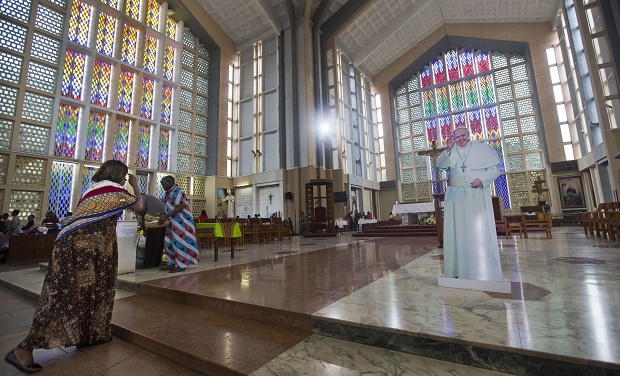Pope to see challenges faced by Church in Africa

A churchgoer genuflects at the end of the mass, in front of a cardboard cutout of Pope Francis standing next to the pulpit, at the Holy Family Minor Basilica in downtown Nairobi, Kenya Sunday, Nov. 22, 2015. Pope Francis follows his predecessors next week Nov. 25-30, 2015 to visit Africa whose growing numbers of Catholics are seen as a bulwark for a church seeking to broaden its appeal amid secularism, competing Christian faiths and violent extremism, in a trip that will take him to Kenya, Uganda and the Central African Republic. AP Photo
VATICAN CITY, Holy See—Africa remains fertile territory for the Catholic Church but the rise of Islamism and competition from evangelical churches have left it facing tough challenges as Pope Francis prepares for his first visit to the continent.
READ: Growing Catholic Church to greet Pope Francis in Africa
As believer numbers dwindle in many industrialized countries, Africa has picked up the slack.
In 1980, one in seven of the world’s Catholics was born in Africa. By 2012 that figure had risen to one in six, according to researchers at Georgetown University.
Strong population growth points to the trend continuing and important voices within the Church, such as the Guinean Cardinal Robert Sarah, have suggested the continent can be the catalyst for a regeneration of Catholicism worldwide.
Article continues after this advertisementOthers are more circumspect, arguing that the faith, brought to Africa by missionaries only a century and a half ago, has shallow roots in the continent and that its Christian culture is fragile.
Article continues after this advertisementFather Angelo Romano, an Africa expert in the Sant’Egidio community, sees elements of light and shade when assessing where the Church is on the eve of Francis’s trip to Kenya, Uganda and the Central Africa Republic.
READ: Uganda fundraises, spruces up shrine for papal visit
“The African Church has a missionary vocation, tries to promote peace and coexistence with other faiths and is always supportive of democracy,” he said.
“But its lay structures are still too weak and the clergy has difficulty keeping up with the changes African society is going through.”
In all three countries he is due to visit, Francis will find Christian communities on the defensive in the face of Islamic radicalism.
Uganda and Kenya are both involved in combatting Somalian jihadists who killed 148 people at Kenya’s Garissa university in April while the CAR has witnessed gruesome scenes of sectarian violence between Muslims and Christians.
Church ‘too boring’
Priests on the ground in all three countries fear mosques financed by Gulf monarchies are allowing radical preachers to promote fundamentalist interpretations of the Islamic faith.
Meanwhile Pentecostal and other evangelical churches are mushrooming in poorer neighborhoods, capitalising on a more festive approach to worship, a simpler, often more hardline, message and their charismatic-mystical elements to draw hundreds of thousands of Catholics away from the Church.
“These Churches are the product of all the established Churches—Catholic, Protestant or Anglican—to adapt to local cultures,” said Father Giulio Albanese, Radio Vatican’s Africa expert. Catholic liturgy has remained too Roman and services are too sombre for African tastes, observers say.
Francis, who started his religious career with the desire to become a missionary, will use his visit to underline the important social role of the Church in Africa, notably visiting a shanty-town in Nairobi where Jesuit priests run a technical school and a centre for mothers in difficulty, and a refugee camp in the troubled CAR’s capital, Bangui.
More Catholic than Pope
At a recent gathering of bishops around the world, African bishops framed themselves as defenders of Catholic teaching on the family and sexual mores in the face of a tendency among Catholics in the West to ignore the Church’s teaching on questions such as contraception and divorce.
The bishops also denounced what they see as attempts by the West to link aid to African countries reforming laws to ensure women have access to abortions and that homosexuality is no longer outlawed.
Vatican insiders however are quick to point out that many African priests and bishops pay scant regard to the Church’s requirement of celibacy for its clergy.
“They are more Catholic than the Pope but their clergy is the most profligate,” one source said, on condition of anonymity. Some of them “have fathered numerous children and have several women on the go.”
The African Church has also not been untainted by the taste for luxury and nepotism endemic in many of the region’s governments.
Senior clerics have frequently been accused of complicity with corrupt regimes and the Church’s presence in African continue to bears the stains of its failure to do anything to prevent the 1994 Rwandan genocide.